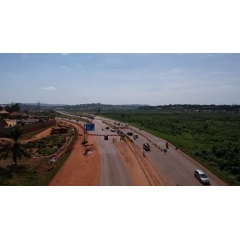New Master Plan to Shape a More Sustainable Transport Sector in Uganda
COWI has won the contract to assist the Ugandan Ministry of Works and Transport in the development of a new national transport master plan. Purpose is to promote better strategic transportation planning and provide recommendations on investment priorities and measures needed to support economic growth and the living conditions of citizens.
The Ugandan economy and population are growing, and the government has already invested heavily in new infrastructure, mainly roads, to accelerate the socio-economic development of the country. However, a lot more is needed to enable continuous and sustainable progress of all transport modes.
To meet the need a new national transport master plan is now taking shape.
“The plan will provide guidance to where and how the country’s transport infrastructure and services covering roads, railways, inland waterways and air transport should develop from 2021 – 2040. Purpose is to facilitate further economic growth and improve living conditions of citizens,” says Karsten Sten Pedersen, Project Director at COWI assisting the Ministry of Works and Transport in the development of a new national transport master plan.
Sustainability measures are high on the agendaAmong the objectives in the new master plan is to analyse the need for public transport and promote the best way forward to increase mobility and a more sustainable transport sector. This is particularly relevant to the Greater Kampala area characterized by congestion and inefficient transit service provision, poor regulation and dominance of low capacity systems such as Minibus taxis and motor-cycles.
“Promoting more sustainable solutions to the traffic challenges facing the country will be in focus in line with Vision 2040 and the Sustainable Development Goals, also signed by the Ugandan government. This is highly needed, not least to avoid the deterioration of transport assets,” says Karsten Sten Pedersen.
To increase the likeliness of a successful implementation rate, there will be a strong focus on follow-up mechanisms in the plan.
“Obviously, funding is an important aspect of transport investments, but in developing countries the biggest challenge is often inadequate institutional capacity. Planning without clear processes, effective systems and implementation capacity will inevitably lead to underachievement. To support our client and the Ugandan society as much as possible, we will seek to integrate relevant measures in the plan, which can help mitigate those risks,” says Karsten Sten Pedersen.
The project is funded by EU and COWI provides overall project management on behalf of the COWI-WYG-Gauff Joint Venture.
( Press Release Image: https://photos.webwire.com/prmedia/5/237007/237007-1.jpg )
WebWireID237007
This news content was configured by WebWire editorial staff. Linking is permitted.
News Release Distribution and Press Release Distribution Services Provided by WebWire.
